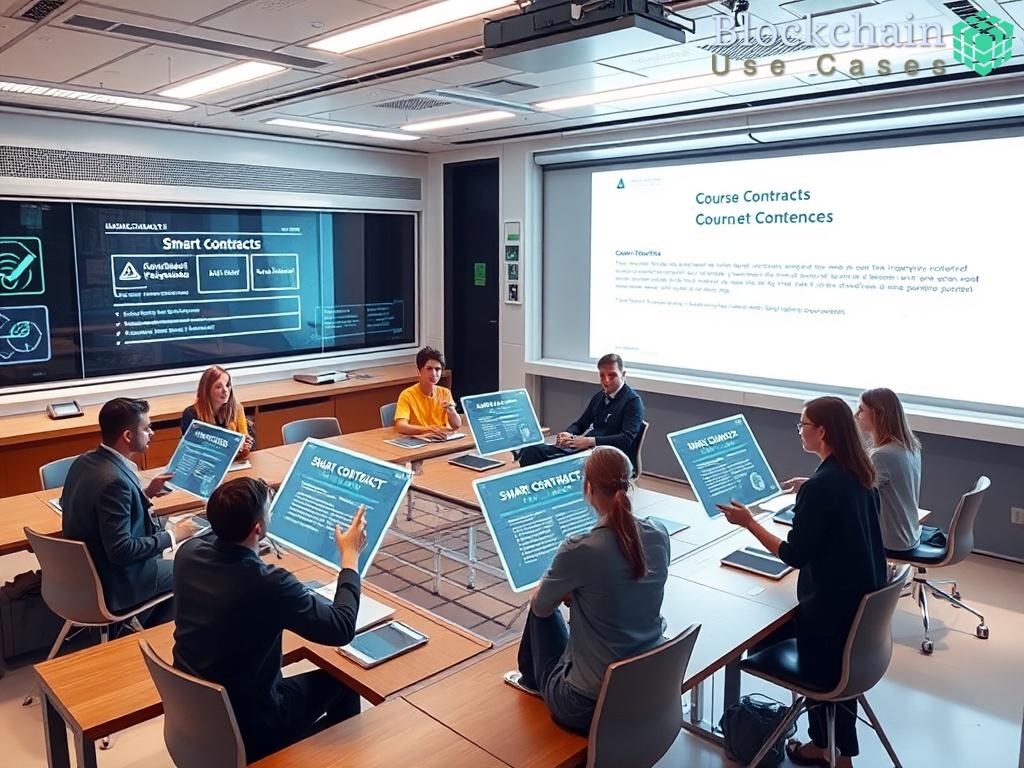Introduction to Smart Contracts in Education

As educational institutions strive to keep pace with technological advancements, the application of smart contracts emerges as a revolutionary approach to streamline administrative processes. One of the significant areas where smart contracts can make a profound impact is in the verification of course prerequisites. This innovation not only enhances efficiency but also adds a layer of trust and security in the academic environment.
Smart contracts are self-executing contracts with the terms of the agreement directly written into lines of code. In the context of education, these contracts can automate the verification of prerequisites that students must meet before enrolling in specific courses. This automation reduces the administrative burden on staff and minimizes human error, ensuring that students only enroll in courses for which they are qualified.
By leveraging blockchain technology, smart contracts provide a secure and transparent way to manage educational records. Every prerequisite completion can be recorded on the blockchain, making it immutable and easily verifiable by the institution. This system not only saves time but also fosters a more organized approach to educational pathways.
Adopting smart contracts in educational institutions offers numerous advantages that can transform the enrollment process for students and administrators alike. The following list highlights some of the most significant benefits:
- Increased Efficiency: Automated verification processes reduce the time spent on manual checks, allowing students to focus on their studies.
- Enhanced Security: The use of blockchain technology ensures that academic records are secure and tamper-proof.
- Improved Transparency: Students can independently verify their qualifications and prerequisites, promoting a transparent educational system.
- Cost-Effective Solutions: Reducing administrative overhead can lead to significant cost savings for institutions.
- Streamlined Processes: Simplifying the prerequisite verification process leads to a more user-friendly experience for students.
In conclusion, the integration of smart contracts into educational systems represents a forward-thinking approach to managing course prerequisites. By embracing this technology, institutions can not only enhance operational efficiency but also ensure a fair and transparent learning environment for all students.
Automating Prerequisite Verification Processes
In the realm of education, the need for efficient and reliable systems has never been more pressing. The integration of smart contracts into the prerequisite verification process offers an innovative solution that simplifies the way institutions manage course eligibility. By automating these processes, educational institutions can significantly enhance both the student experience and administrative efficiency.
Smart contracts operate on a decentralized blockchain platform, which means that once conditions are met, the verification process is triggered automatically. This not only minimizes the potential for human error but also ensures that the prerequisites are validated swiftly and accurately. With every student’s progress recorded on the blockchain, institutions can easily track and verify academic achievements without the need for extensive manual oversight.
The shift to automated prerequisite verification through smart contracts has profound implications for academic integrity. By providing a transparent and tamper-proof method of validating student qualifications, institutions can foster a culture of trust among students and faculty alike. This transparency allows students to independently verify their eligibility for courses, thus empowering them and enhancing their confidence in the academic system.
Moreover, this technology serves as a deterrent against fraudulent activities, such as falsifying academic records. As each prerequisite is logged on the blockchain, making alterations becomes nearly impossible without detection. Consequently, institutions are not only safeguarding their academic standards but are also enhancing the overall credibility of their programs.
Benefits of Blockchain for Course Management
As educational institutions explore innovative solutions to streamline course management, the adoption of blockchain technology presents a transformative opportunity. By leveraging the unique capabilities of blockchain, institutions can enhance the integrity, efficiency, and accessibility of course management processes. This evolution not only aligns with the growing demand for transparency but also empowers both students and educators in unprecedented ways.
One of the most compelling advantages of utilizing blockchain for course management is the unparalleled level of data integrity and security it offers. Unlike traditional systems that are susceptible to unauthorized alterations, blockchain operates on a decentralized ledger that records every transaction in a tamper-proof manner. This means that once a student’s prerequisite completion is entered into the blockchain, it becomes immutable, providing an additional layer of trust. Educators and administrators can confidently rely on this verified data, fostering a culture of academic honesty.
Another noteworthy benefit of blockchain technology is its ability to facilitate seamless collaboration between various educational stakeholders. Through smart contracts, institutions can create a unified platform where students, educators, and administrators interact transparently. This interconnectedness not only streamlines communication but also ensures that all parties have real-time access to essential information regarding course prerequisites. Students can instantly verify their eligibility for courses, while instructors can access accurate records of student achievements without delay.
Moreover, the decentralized nature of blockchain eliminates the need for cumbersome intermediaries, reducing processing times and administrative overhead. This efficiency leads to a more agile educational environment that can adapt to changing student needs and institutional goals. As a result, blockchain technology not only enhances the course management experience but also aligns educational institutions with the demands of a rapidly evolving digital landscape.
| Aspect | Traditional Course Management | Blockchain-Based Course Management |
|---|---|---|
| Data Integrity | Vulnerable to tampering | Tamper-proof and immutable |
| Access to Information | Delayed access and verification | Real-time access for all stakeholders |
| Administrative Overhead | High processing times and costs | Reduced processing times and costs |
Challenges in Implementing Smart Contracts
As educational institutions begin to embrace the remarkable potential of smart contracts for automating course prerequisite verification, they inevitably encounter a range of challenges that can hinder the seamless integration of this technology. Understanding these obstacles is crucial for stakeholders seeking to leverage smart contracts effectively, ensuring a smoother transition and optimal outcomes.
One of the primary challenges in implementing smart contracts is the technical limitations associated with blockchain platforms. Many existing blockchain solutions struggle with scalability, particularly when handling a large volume of transactions concurrently. As educational institutions typically manage numerous student registrations and prerequisite verifications simultaneously, these scalability issues can lead to delays and inefficiencies, potentially undermining the intended benefits of automation.
Another significant barrier involves the legal and regulatory landscape surrounding smart contracts. The lack of standardized regulations and legal frameworks governing the use of smart contracts in education can create uncertainty for institutions considering adoption. Furthermore, discrepancies in regulations across jurisdictions may complicate compliance efforts, making it essential for institutions to thoroughly assess legal implications before deploying smart contracts.
Institutions may also face internal resistance to adopting smart contract technology, stemming from a reluctance to deviate from traditional administrative processes. Stakeholders, including faculty and administrators, may be skeptical about the reliability and effectiveness of smart contracts, fearing potential disruptions to established workflows. Addressing these concerns through comprehensive training and education on the benefits of smart contracts is essential to facilitate a successful implementation.
In summary, while the integration of smart contracts into course prerequisite verification presents significant advantages, it is imperative for educational institutions to navigate these challenges carefully. By addressing technical limitations, legal uncertainties, and resistance to change, institutions can position themselves to harness the full potential of smart contracts, paving the way for a more efficient and transparent educational landscape.
Future Trends in Automated Academic Credentialing
As educational institutions continue to innovate and adapt to the demands of a digital-first world, the future of automated academic credentialing appears not only promising but also transformative. The advent of smart contracts is set to redefine how credentials are issued, verified, and maintained, paving the way for a more efficient and trustworthy educational ecosystem.
In the coming years, we can expect a shift towards decentralized credentialing systems powered by blockchain technology. This evolution will allow for a more democratized approach to academic records, where students have complete control over their credentials. Instead of relying solely on educational institutions to manage these records, individuals can autonomously share their verified achievements with potential employers or other educational entities. This not only enhances the privacy of personal data but also fosters a sense of ownership and accountability among students.
Moreover, the integration of smart contracts with emerging technologies such as Artificial Intelligence (AI) and the Internet of Things (IoT) is expected to further revolutionize academic credentialing. AI algorithms could assess and validate student performance in real-time, automatically triggering smart contracts that issue credentials or course completions based on predetermined criteria. Simultaneously, IoT devices could track student engagement and attendance, ensuring that the verification process is not only streamlined but also enriched with data-driven insights.
As these technologies converge, institutions will be able to create a seamless and transparent credentialing process that minimizes administrative burdens while enhancing the overall academic experience. This futuristic approach will ensure that students are recognized for their efforts in real-time, creating a dynamic environment where learning and achievement are continuously acknowledged.
In conclusion, the future of automated academic credentialing through smart contracts holds the promise of not only simplifying processes but also fostering a culture of trust, transparency, and empowerment within educational institutions. As these systems become more sophisticated and widespread, we will witness a significant shift in how academic achievements are perceived and validated in the professional world.





